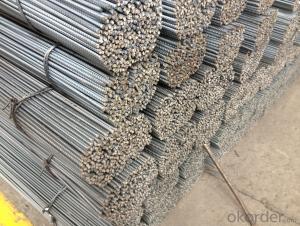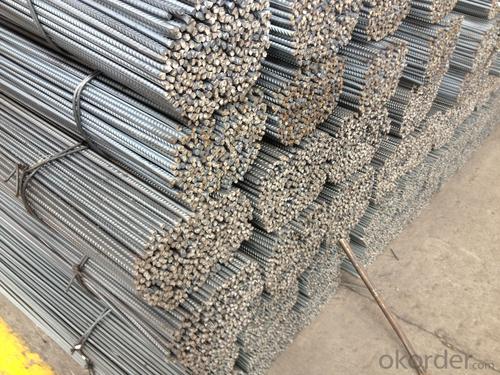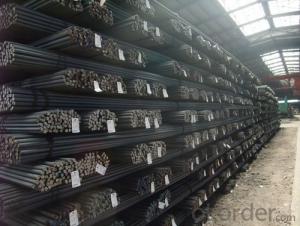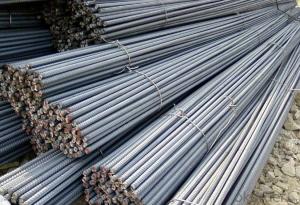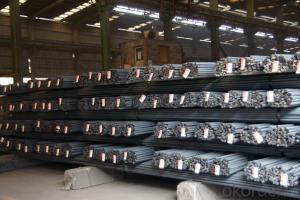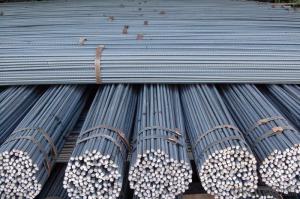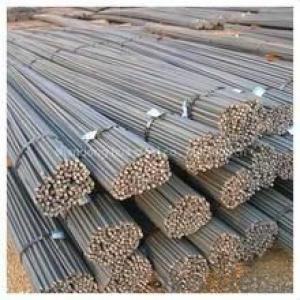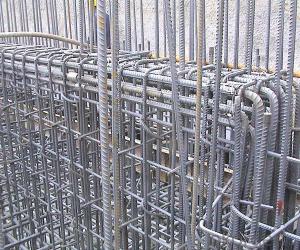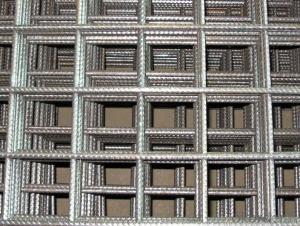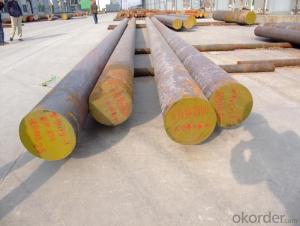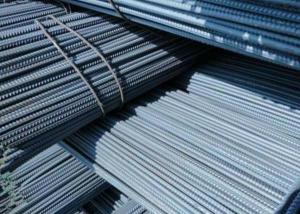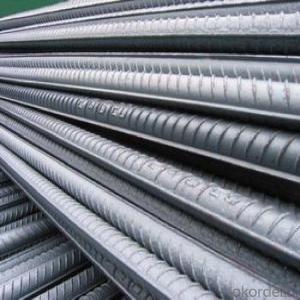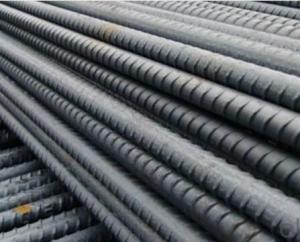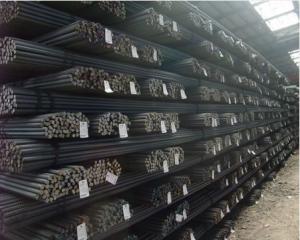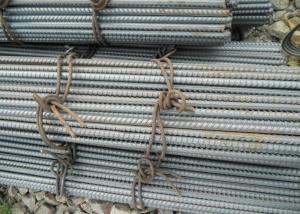Steel Rebar,Reinforcement Steel Bar,Structural Steel bar
- Loading Port:
- China main port
- Payment Terms:
- TT or LC
- Min Order Qty:
- 100 m.t.
- Supply Capability:
- 100000 m.t./month
OKorder Service Pledge
OKorder Financial Service
You Might Also Like
Product Description:
OKorder is offering Steel Rebar,Reinforcement Steel Bar,Structural Steel bar at great prices with worldwide shipping. Our supplier is a world-class manufacturer of steel, with our products utilized the world over. OKorder annually supplies products to African, South American and Asian markets. We provide quotations within 24 hours of receiving an inquiry and guarantee competitive prices.
Product Applications:
Steel Rebar,Reinforcement Steel Bar,Structural Steel bar are ideal for structural applications and are widely used in the construction of buildings and bridges, and the manufacturing, petrochemical, and transportation industries.
Product Advantages:
OKorder's Steel Rebar,Reinforcement Steel Bar,Structural Steel bar are durable, strong, and wide variety of sizes.
Main Product Features:
· Premium quality
· Prompt delivery & seaworthy packing (30 days after receiving deposit)
· Can be recycled and reused
· Mill test certification
· Professional Service
· Competitive pricing
Product Specifications:
Manufacture: Hot rolled
Grade: HRB335,HRB400,HRB500
Certificates: ISO, SGS, BV, CIQ
Length: 6m – 12m, as per customer request
Packaging: Export packing, nude packing, bundled
Deformed Steel Bar | ||
Diameter (MM) | Cross Sectional Area (MM2) | Theorectical Weight (KG/M) |
6 | 28.27 | 0.222 |
8 | 50.27 | 0.395 |
10 | 78.54 | 0.617 |
12 | 113.1 | 0.888 |
14 | 153.9 | 1.21 |
16 | 201.1 | 1.58 |
18 | 254.5 | 2 |
20 | 314.2 | 2.47 |
22 | 380.1 | 2.98 |
25 | 490.9 | 3.85 |
28 | 615.8 | 4.83 |
32 | 804.2 | 6.31 |
36 | 1018 | 7.99 |
40 | 1257 | 9.87 |
FAQ:
Q1: How many tons of steel products could be loaded in containers?
A1: Usually the steel products are delivered by bulk vessel because of the large quantity and the freight. However, there are no bulk vessel enter some seaports so that we have to deliver the cargo by containers. The 6m steel product can be loaded in 20FT container, but the quantity is changed according to the size, usually from 18tons to 25tons.
Q2: How do we guarantee the quality of our products?
A2: We have established an advanced quality management system which conducts strict quality tests at every step, from raw materials to the final product. At the same time, we provide extensive follow-up service assurances as required.
Q3: How soon can we receive the product after purchase?
A3: Within three days of placing an order, we will arrange production. The normal sizes with the normal grade can be produced within one month. The specific shipping date is dependent upon international and government factors, the delivery to international main port about 45-60days.
Images:
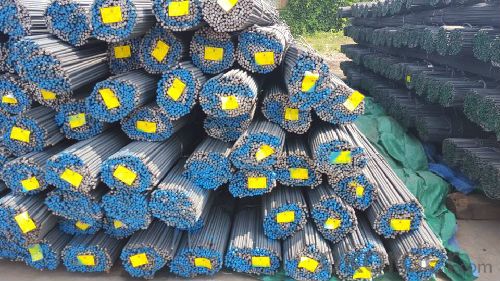
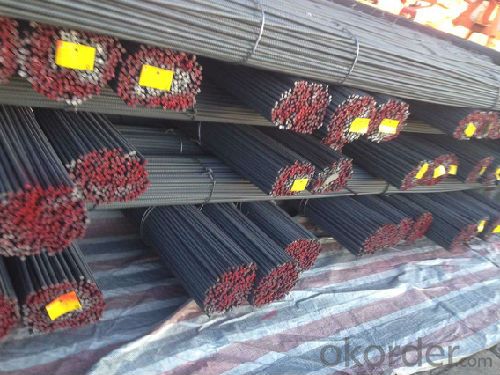
- Q: How do steel rebars resist alkali-silica reaction in concrete?
- The primary reason why steel rebars can withstand the alkali-silica reaction in concrete is because of the passive film that forms on their surface and the alkaline environment of the concrete. When steel rebars are embedded in concrete, they develop a passive film on their surface. This film serves as a protective layer that prevents direct contact between the steel and the aggressive alkali-silica reactive aggregates that are present in the concrete. The formation of this passive film is a result of the high pH of the alkaline environment created by the cement in the concrete, which usually has a pH level of 12-13. This high pH aids in the creation of an oxide layer on the surface of the steel rebar, effectively shielding it from the reactive elements in the aggregates. Moreover, the alkaline environment of the concrete plays a crucial role in maintaining the passivity of the steel rebars. The alkalinity of the concrete enables the passive film to remain stable and intact, providing a continuous barrier against the alkali-silica reaction. As long as the pH of the concrete remains high, the steel rebars will continue to resist the reaction. It is important to note that the thickness and quality of the passive film on the steel rebars are vital in guaranteeing their resistance to the alkali-silica reaction. Any factors that can compromise the integrity of this film, such as carbonation or chloride contamination, can increase the risk of the reaction occurring. In conclusion, the resistance of steel rebars to the alkali-silica reaction in concrete is primarily due to the presence of a passive film on their surface, which is formed by the alkaline environment of the concrete. This film functions as a protective barrier, preventing direct contact between the steel and the reactive aggregates and minimizing the likelihood of the reaction occurring.
- Q: What is the effect of welding on the properties of steel rebars?
- The effect of welding on the properties of steel rebars can vary depending on various factors such as the welding process, parameters, and the quality of the weld. Generally, welding can introduce localized heat, which may lead to changes in the microstructure and mechanical properties of the rebars. These changes can include the formation of a heat-affected zone (HAZ) with altered hardness, strength, and toughness. Additionally, the weld itself may have different properties compared to the base metal, such as lower ductility or higher susceptibility to cracking. Therefore, it is crucial to carefully control the welding process and ensure proper welding techniques to minimize any adverse effects on the rebars' properties.
- Q: What is the role of steel rebars in the construction of highway overpasses?
- Steel rebars play a crucial role in the construction of highway overpasses as they provide reinforcement and strength to the concrete structures. Rebars are used to reinforce the concrete, preventing cracks and improving its resistance to tension and bending forces. This reinforcement ensures the durability, stability, and overall safety of the highway overpasses, allowing them to withstand heavy loads and harsh external conditions.
- Q: Can steel rebars be used in structures with extreme temperature variations?
- Steel rebars can generally be used in structures with extreme temperature variations. Steel has a high melting point and is known for its durability and strength, making it suitable for various construction applications. However, it is important to consider a few factors when using steel rebars in such structures. Firstly, steel has a coefficient of thermal expansion, which means it expands and contracts with temperature changes. This expansion and contraction can potentially cause stress and strain on the structure if not properly accounted for. To address this issue, engineers and architects use various design techniques, such as providing expansion joints or allowing for thermal movement, to accommodate the steel's thermal expansion and prevent damage. Secondly, extreme temperature variations can affect the mechanical properties of steel. When exposed to high temperatures, steel can lose its strength and stiffness, which might compromise the structural integrity. Conversely, low temperatures can lead to embrittlement, making the steel more susceptible to cracking or fracturing. Therefore, it is crucial to choose the appropriate grade and quality of steel rebars that are specifically designed to withstand the expected temperature variations. Furthermore, the type of structure and its intended use should be considered. For instance, in structures where extreme temperature variations are anticipated, such as bridges or buildings in regions with hot summers and cold winters, the design should incorporate thermal insulation or other measures to prevent excessive heat transfer or thermal stress accumulation. In conclusion, steel rebars can be used in structures with extreme temperature variations, but proper considerations must be taken. By accounting for thermal expansion, selecting suitable steel grades, and incorporating design techniques to accommodate temperature changes, the structural integrity and performance can be maintained, ensuring the safety and longevity of the construction.
- Q: Can steel rebars be used in road and bridge construction?
- Yes, steel rebars can be used in road and bridge construction. Steel rebars provide structural integrity and strength to reinforce concrete structures, making them suitable for use in the construction of roads and bridges. They enhance the durability, load-bearing capacity, and resistance to cracking and deformation in these infrastructure projects.
- Q: Can steel rebars be used in power plant construction?
- Yes, steel rebars can be used in power plant construction. Steel rebars are commonly used as reinforcement in concrete structures, including power plants, to enhance their strength and durability.
- Q: Can steel rebars be used in bridge expansion joint construction?
- Yes, steel rebars can be used in bridge expansion joint construction. Steel rebars are commonly used as reinforcement in concrete structures, including bridge decks and expansion joints. They provide added strength and stability to handle the dynamic forces and movements experienced by bridges, making them suitable for use in expansion joint construction.
- Q: Can steel rebars be used in tunnels or underground transportation systems?
- Tunnels or underground transportation systems can indeed utilize steel rebars. These rebars are frequently employed in construction projects, including tunnels and underground transportation systems, owing to their durability and high tensile strength. By providing reinforcement to concrete structures, they enhance their structural integrity and prevent cracking or collapsing. In underground environments where moisture and other corrosive elements may exist, the resistance to corrosion exhibited by steel rebars is particularly crucial. Moreover, steel rebars can be easily fabricated and installed, making them a practical option for construction projects with tight schedules. All in all, steel rebars constitute a dependable and widely utilized material in tunnels and underground transportation systems, ensuring the safety and durability of the structures.
- Q: How are steel rebars bent on-site?
- Rebar benders, specialized machinery used on-site, are typically employed to bend steel rebars. These machines possess the requisite force and precision to achieve the desired shape and angle for the rebars. To begin the process, the location where the rebar needs to be bent is measured and marked. Subsequently, the rebar is placed within the rebar bender, which is equipped with adjustable rollers and bending arms. These rollers serve to guide the rebar throughout the bending process, while the bending arms gradually apply the necessary force to bend the rebar to the desired angle and shape. The operator of the rebar bender meticulously adjusts the rollers and bending arms to ensure the accurate bend radius and angle are achieved. This requires skill and experience to guarantee the rebars are bent precisely in accordance with the construction plans and specifications. After the rebar has been bent to the desired shape, it is securely fastened in place using tie wire or rebar clips. This ensures that the rebars retain their shape and position during the process of pouring concrete. Bending rebars on-site presents several advantages. Firstly, it allows for greater flexibility and adaptability during construction, as the rebars can be customized and adjusted to meet specific design requirements. Secondly, on-site bending reduces transportation and storage costs, since rebars can be delivered in longer lengths and bent as needed. Lastly, on-site bending saves time and enhances construction efficiency, as the rebars can be bent and installed immediately, eliminating the need for off-site fabrication and transportation delays. In summary, steel rebars are bent on-site utilizing specialized rebar benders, which provide the necessary force and precision to achieve the desired shape and angle. This process offers flexibility, cost savings, and improved construction efficiency.
- Q: What are the guidelines for the proper anchoring of steel rebars in walls?
- To ensure the structural integrity and stability of the construction, it is crucial to properly anchor steel rebars in walls. Here are some guidelines to adhere to for the correct anchoring of steel rebars in walls: 1. Determine the necessary rebar size and spacing: The design specifications and load requirements dictate the size and spacing of rebars. Consult a structural engineer or refer to building codes for the appropriate rebar size and spacing. 2. Clean and prepare the concrete surfaces: Prior to anchoring the rebars, ensure that the concrete surfaces are clean and devoid of dust, debris, and loose material. Utilize a wire brush or compressed air to eliminate any contaminants. 3. Employ appropriate anchoring techniques: The most widely used method for anchoring steel rebars in walls is embedding them into the concrete. Ensure secure embedding by following these steps: a. Drill holes: Drill holes in the concrete wall at designated locations and depths, ensuring the hole diameter matches the rebar size. b. Clean the drilled holes: Utilize compressed air or a brush to remove any dust or debris from the drilled holes. c. Insert rebars: Insert the rebars into the drilled holes, making sure they reach the required embedment depth. d. Maintain proper spacing: Follow design requirements to maintain the specified spacing between rebars. e. Secure rebars: Use suitable anchoring materials like epoxy resin or grout to secure the rebars in place. Adhere to the manufacturer's instructions for mixing and applying the anchoring material. f. Verify proper alignment: Before the anchoring material sets, ensure the rebars are correctly aligned both horizontally and vertically. 4. Allow sufficient curing time: After anchoring the rebars, allow ample time for the anchoring material to cure. This guarantees that the rebars are firmly secured in place. 5. Adequately protect the rebars: Once the rebars are anchored, protect them from corrosion by applying a suitable corrosion-resistant coating or by using corrosion-resistant rebars. It is imperative to adhere to these guidelines, as improper anchoring of steel rebars can compromise the structural integrity of the walls and pose safety risks. Always consult a qualified structural engineer or building professional for specific guidelines tailored to your project.
Send your message to us
Steel Rebar,Reinforcement Steel Bar,Structural Steel bar
- Loading Port:
- China main port
- Payment Terms:
- TT or LC
- Min Order Qty:
- 100 m.t.
- Supply Capability:
- 100000 m.t./month
OKorder Service Pledge
OKorder Financial Service
Similar products
Hot products
Hot Searches
Related keywords
